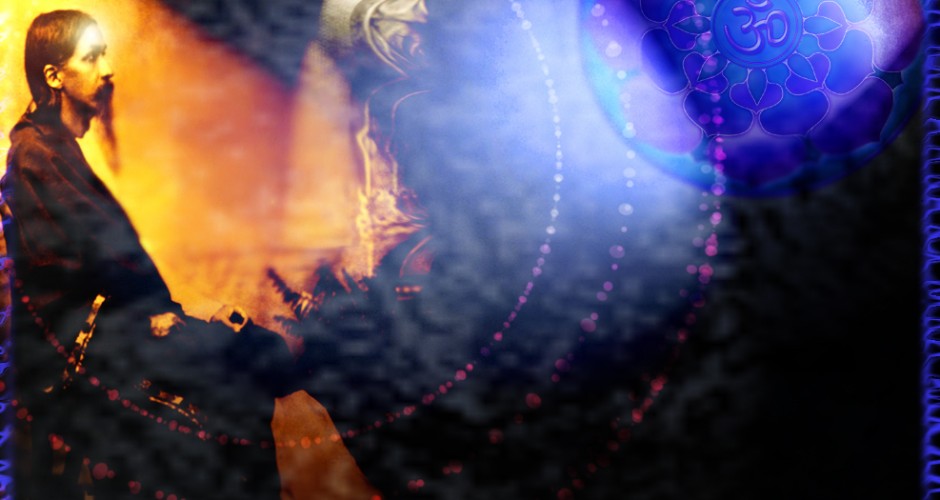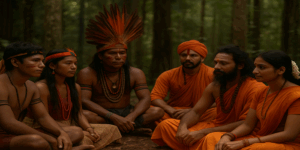Sri Aurobindo (1872-1950)
“The will of a single hero can breathe courage into the hearts of a million cowards “
Sri Aurobindo was one of the greatest philosophers, revolutionary ,mystics and visionaries of modern history. He was a major leader in India’s freedom movement. Later in life he became a sage and scholar. His teachings have attracted many people from all around the world. The ashram that he founded is still thriving today, and centres bearing his name can be found in many countries.
The Early Years
 Born in Calcutta, Sri Aurobindo was sent to England for his studies at the tender age of six. After his schooling he went on to study at Cambridge University in 1890.
Born in Calcutta, Sri Aurobindo was sent to England for his studies at the tender age of six. After his schooling he went on to study at Cambridge University in 1890.
Sri Aurobindo’s father had been very eager to send his son to England for his studies. Like many other Indians at the time he thought that the only way to save and uplift the country was by a full-scale imitation of European habits and customs. He even made sure that Aurobindo as a child didn’t learn his mother tongue! This attempt at imitation is a typical psychological phenomenon that affects the people of any colonised country.
 While in England, Aurobindo had observed the society first hand, and learnt its strengths and weaknesses. He figured that it wouldn’t be in anybody’s interest to blindly imitate European ideas without understanding the basis of one’s own culture and civilisation. From what he had so far seen it would serve humanity better if India could recapture her own Hindu essence and project it into a reinvigorated vision for the future.
While in England, Aurobindo had observed the society first hand, and learnt its strengths and weaknesses. He figured that it wouldn’t be in anybody’s interest to blindly imitate European ideas without understanding the basis of one’s own culture and civilisation. From what he had so far seen it would serve humanity better if India could recapture her own Hindu essence and project it into a reinvigorated vision for the future.
Return to India
It was in 1893 that Sri Aurobindo returned to India. At that time the struggle for India’s freedom was in its early stages. Straightaway he became involved in the movement. He began by writing a series of fiery articles in a daily newspaper, while he was aged just 21. The column had to be stopped following pressure on the newspaper’s editor, due to sharp criticism of the British colonial government and the slavish Indian leaders of the time.
After this, he became a teacher, and eventually the Principal of Baroda College. He gradually became enraged at the education system at colleges and schools, which was being used as a tool by the British for creating a deep inferiority complex and cultural alienation amongst the people.
Freedom Fighter
Sri Aurobindo soon left his job and devoted all his energy towards India’s renaissance. His work was many sided. It included spreading awareness and knowledge through his role as editor of newspapers and magazines, creating authentic Hindu education in schools and colleges, encouraging social work to alleviate sickness and poverty, and even initiating armed rebellion.
Lord Minto who was then Viceroy of India wrote the following about him:
“He is the most dangerous man we have to deal with at present. I attribute the spread of seditious doctrines to him personally in a greater degree than to any other single individual…”
Aurobindos Spiritual Realisation in Jail
In 1908 the British authorities arrested and jailed Sri Aurobindo following an assassination attempt on a judge, in which he was implicated. A legal campaign by one of his followers, Chittaranjan Dass, enabled his release after one year. In jail Sri Aurobindo’s life took a decisive turn. Before jail Aurobindo had practiced spiritual disciplines, but he had always wished to do so more intensely. In jail he devoted himself to spirituality and had a series of direct experiences and realisations .In prison he had a vision of Lord Krishna and the spirit of Swami Vivekananda spoke to him.Its during his sentence he had a complete realization of the vision and essence of Sanatan Dharma.
When he was released from jail he gave a famous speech in which he described what had been revealed to him, known as the ‘Uttarpara Speech’ (click here to access the full text of the speech).
Escape to Pondicherry,
Soon after his release, the British administration was out to silence him once more, demanding his arrest for inflammatory writing. Sri Aurobindo entered Pondicherry, which was a French colony in India. The British had no power there. He set up a residence, which soon flourished into an ashram where friends, disciples and seekers gathered around him.
 Sri Aurobindo continued writing for the public through a monthly magazine called the Arya. He gradually withdrew into increasingly intense spiritual practice, leaving the material responsibility of the disciples and the growing ashram to a lady named Mira, who is affectionately called “The Mother”. In these years of deep meditation he delved deep into the depths of the spirit. His aim was to fully discover and map out the path to a divine future for the world. The discoveries he made were through direct realisation of many divine mysteries, in the same way as the Vedic Rishis.
Sri Aurobindo continued writing for the public through a monthly magazine called the Arya. He gradually withdrew into increasingly intense spiritual practice, leaving the material responsibility of the disciples and the growing ashram to a lady named Mira, who is affectionately called “The Mother”. In these years of deep meditation he delved deep into the depths of the spirit. His aim was to fully discover and map out the path to a divine future for the world. The discoveries he made were through direct realisation of many divine mysteries, in the same way as the Vedic Rishis.
The great books and literature
 Sri Aurobindo wrote extensively and has left behind a breath-taking legacy of works, most of which are in English. He wrote works on the Vedas and Mahabharata, a commentary on the Bhagavad Gita and the Upanishads. He also wrote plays, poetry and stories. He presented a Hindu view on international issues such as war, self-determination, the possibility of international unity, as well as the shortcomings and potentials arising from the League of Nations which had been set up following the First World War. He wrote important books presenting what he called an “aggressive defence of Hindu culture” because he felt that it was necessary to reverse the process of Hindus getting affected and alienated by constant negative propaganda. He even wrote commentaries on those non-Indian non-Hindu philosophers for whom he had respect, such as Plato. His most famous works are the descriptions of his own spiritual life and thought.
Sri Aurobindo wrote extensively and has left behind a breath-taking legacy of works, most of which are in English. He wrote works on the Vedas and Mahabharata, a commentary on the Bhagavad Gita and the Upanishads. He also wrote plays, poetry and stories. He presented a Hindu view on international issues such as war, self-determination, the possibility of international unity, as well as the shortcomings and potentials arising from the League of Nations which had been set up following the First World War. He wrote important books presenting what he called an “aggressive defence of Hindu culture” because he felt that it was necessary to reverse the process of Hindus getting affected and alienated by constant negative propaganda. He even wrote commentaries on those non-Indian non-Hindu philosophers for whom he had respect, such as Plato. His most famous works are the descriptions of his own spiritual life and thought.
In all these years, Sri Aurobindo never lost track of happenings in the outside world. He continued to keep in touch with many disciples through letters and he read newspapers regularly to stay aware of important happenings. He issued public statements from time to time.
When India’s Independence Day came, it fell on the same day as Aurobindo’s birthday. It was a fitting tribute that this should be so.
Hijacking Aurobindo
The religious culture which now goes by the name of Hinduism … gave itself no name, because it set itself no sectarian limits; it claimed no universal adhesion, asserted no sole infallible dogma, set up no single narrow path or gate of salvation; it was less a creed or cult than a continuously enlarging tradition of the Godward endeavour of the human spirit. An immense many-sided and many-staged provision for a spiritual self-building and self-finding, it had some right to speak of itself by the only name it knew, the eternal religion, Sanatana Dharma…. (Sri Aurobindo, 1919)
 Of recent years there has been an academic controversy amongst the more scholarly followers of Sri Aurobindo on the subject of whether he should be considered a Hindu and whether his teachings could be classed as Hinduism. Unfortunately there are many western or westernised Indian followers of Hindu gurus who will do their utmost to dissociate themselves from the word “Hindu” which Hindu author and writer Rajiv Malhotra refers to the syndrome as the U- Turn
Of recent years there has been an academic controversy amongst the more scholarly followers of Sri Aurobindo on the subject of whether he should be considered a Hindu and whether his teachings could be classed as Hinduism. Unfortunately there are many western or westernised Indian followers of Hindu gurus who will do their utmost to dissociate themselves from the word “Hindu” which Hindu author and writer Rajiv Malhotra refers to the syndrome as the U- Turn
Such individuals who try their best to escape any association with the word Hindu typically feel that their sage/guru is of universal importance, belonged to the whole world, and cared about everyone – Hindu or non-Hindu alike. Therefore it is a travesty for such a great universal teacher to be called a Hindu. What they fail to realise is that the basic teachings of Hinduism (the Vedas, Upanishads, Gita and other sacred literature) are every bit as universal as their own cherished guru.
Hinduism and Universal are synonymous
 All the thousands of true Hindu sages through the passage of time have always said that their teachings are universal, and have had a concern for all humanity. This does not make them non-Hindu. This just means that at its core – Hinduism itself is universal and embraces the whole of humanity, allowing all to drink the nectar of its wisdom without giving up their identity. But they don’t want to attribute the quality of universalism to Hinduism, because it is unfashionable; Hinduism being associated in the media with backwardness and social ills.
All the thousands of true Hindu sages through the passage of time have always said that their teachings are universal, and have had a concern for all humanity. This does not make them non-Hindu. This just means that at its core – Hinduism itself is universal and embraces the whole of humanity, allowing all to drink the nectar of its wisdom without giving up their identity. But they don’t want to attribute the quality of universalism to Hinduism, because it is unfashionable; Hinduism being associated in the media with backwardness and social ills.
“But to limit Sri Aurobindo to Hinduism is like characterising modern science and technology as purely Christian, since by and large they originated in the Christian countries.”(Mangesh Nadkarni)
 This is quite wrong. Sri Aurobindo acknowledges (and nobody would dare argue otherwise) that he first achieved direct spiritual experience reflecting upon and practicing the yoga of the Bhagavad Gita and Upanishads, with intense devotion to Krishna. Without these he would not have been able to achieve his spiritual realisations, and develop his philosophical teachings. On the other hand, modern science was not developed by persons who were following a Christian line of thought or enquiry. It was developed by enquiry and study into material reality, independently of religion.
This is quite wrong. Sri Aurobindo acknowledges (and nobody would dare argue otherwise) that he first achieved direct spiritual experience reflecting upon and practicing the yoga of the Bhagavad Gita and Upanishads, with intense devotion to Krishna. Without these he would not have been able to achieve his spiritual realisations, and develop his philosophical teachings. On the other hand, modern science was not developed by persons who were following a Christian line of thought or enquiry. It was developed by enquiry and study into material reality, independently of religion.
Hence, the relationship between Sri Aurobindo and Hinduism is quite different to the relationship between modern science and Christianity. Sri Aurobindo’s teachings can be said to be unique and universal – but these teachings would not have developed without the creative field of experimentation that Hinduism provides. Sri Aurobindo was a heroic spiritual experimenter, like the ancient Vedic sages, who wanted to use his experiences and knowledge to transform and save the world. It is accurate to say that the teachings of Sri Aurobindo flowed out of traditional Hinduism.
 The development of modern science did not flow out of Christianity. In some respects it developed in spite of Christianity. The Church often tried to silence persons whose research led them to propose hypotheses that went against certain Christian notions such as the world being 6,000 years old, the world being flat, and the sun going round the Earth, opposition to the theory of evolution etc. By contrast, Sri Aurobindo faced not one iota of difficulty or persecution from the Hindu orthodoxy in publishing whatever he wanted to and pursuing whatever line of spiritual enquiry and experiences he preferred.
The development of modern science did not flow out of Christianity. In some respects it developed in spite of Christianity. The Church often tried to silence persons whose research led them to propose hypotheses that went against certain Christian notions such as the world being 6,000 years old, the world being flat, and the sun going round the Earth, opposition to the theory of evolution etc. By contrast, Sri Aurobindo faced not one iota of difficulty or persecution from the Hindu orthodoxy in publishing whatever he wanted to and pursuing whatever line of spiritual enquiry and experiences he preferred.
To summarise, I’m not saying that one has to “limit Sri Aurobindo to Hinduism” if they don’t want to, but it is ridiculous to say that “to limit Sri Aurobindo to Hinduism is like characterising modern science and technology as purely Christian, since by and large they originated in the Christian countries”. The relationship between Sri Aurobindo’s teachings and Hinduism is radically different to the relationship between modern science and Christianity.
Hardly known in India
Presently Sri Aurobindo is more well known outside India as a great philosopher and mystic but hardly is known in his own country shamelessly. International French journalist and writer Francois Gautier correctly says :
If we, in France, had a great man such as Sri Aurobindo, who was not only as a revolutionary and a yogi, but also a tremendous philosopher and peerless poet, we would cherish him endlessly. His poetry would be taught to children, his philosophical works would be part of the university curriculums, books would be written about him, museums would be built…. In fact, France’s outspoken ambassador in India, Jerome Bonnafont, is an ardent admirer of Sri Aurobindo’s political works.
 But today, amongst Indian politicians (apart from Dr Karan Singh, a scholar on Sri Aurobindo), everybody quotes conveniently from Gandhi, although nobody applies his ideals of charkha, non-violence, khadi and birth control by sexual abstinence. No journalist ever mentions this extraordinary yogi, whose sayings of one hundred years ago are still one hundred per cent relevant today. Not only is he absent from schools and universities, in some manuals written by the Congress, he is branded a ‘terrorist’. Shame on India!
But today, amongst Indian politicians (apart from Dr Karan Singh, a scholar on Sri Aurobindo), everybody quotes conveniently from Gandhi, although nobody applies his ideals of charkha, non-violence, khadi and birth control by sexual abstinence. No journalist ever mentions this extraordinary yogi, whose sayings of one hundred years ago are still one hundred per cent relevant today. Not only is he absent from schools and universities, in some manuals written by the Congress, he is branded a ‘terrorist’. Shame on India!
Maybe now is the Time for Indians and the rest of the world to rediscover Sri Aurobindo and his legacy of empirical spiritual insights to change the world forever ………
Others on Sri Aurobindo,
“And it needed the supreme cultural genius of a Sri Aurobindo, the like of whom the spirit and the creative vision of India alone can create, to give a yet bolder or rather the boldest manifestation to a synthesization of insights in philosophic, cultural and religious or spiritual wisdom and experience and to an invaluable integral conception of the triple Reality”.
Swami Sivananda, founder of the Life Divine Society
At the very first sight I could realise he had been seeking for the Soul and had gained it, and through this long process of realisation had accumulated within him a silent power of inspiration. His face was radiant with an inner light…I felt the utterance of the ancient Hindu Rishis spoke from him of that equanimity which gives the human Soul its freedom of entrance into the All. I said to him, “You have the word and we are waiting to accept it from you. India will speak through your voice to the world, Hearken to me … O Aurobindo, accept the salutations from Rabindranath.”
Rabindranath Tagore,was a Bengali philosopher, poet, and winner of the Nobel Prize for literature in 1913.
“Sri Aurobindo is one of the greatest thinkers of Modern India … the most complete synthesis achieved upto the present between the genius of the West and the East… The last of the great Rishis holds in his outstretched hands, the bow of Creative Inspiration”
Romain Rolland, French writer, awarded the Nobel Prize for literature in 1915
As in the past China was spiritually conquered by a great Indian, so in the future too she would be conquered by another great Indian, Sri Aurobindo, the Maha-Yogi who, “is the bringer of that light which will chase away the darkness that envelops the world to-day.”
Tan Yun-Shan, Director of Chinese studies at Visva-Bharati University, China’s cultural Ambassador to India in 1939.
“Sri Aurobindo, the Master, the highest of mystics, happily presents the rare phenomenon an exposition clear as a beautiful diamond, without the danger of confounding the layman. This is possible because Sri Aurobindo is a unique synthesis of a scholar, theologian and one who is enlightened”
Gabriela Mistral , a Chilean poet, educator, diplomat, and feminist who was the first Latin American to win the Nobel Prize in Literature, in 1945.
“Sri Aurobindo is no visionary. He has always acted his dreams … So from individual self-discipline he has gone to the life of humanity. The Psychology of Social Development, Ideals and Progress and The Ideal of Human Unityshould be carefully considered by all those who are busy preparing blue-prints for the future ”
Times Literary Supplement[London]

This 2 rupee coin was issued under BJP Government in 1998 to commemorate the 125th birth Anniversary. Sri Aurobindo










































For a perspective on the book by Peter Heehs, pls visit http://resurgentindia.org/blog/2012/11/30/the-lives-of-sri-aurobindo-by-peter-heehs-a-critical-appraisal/
But it is a pity that we have a biography of Sri Aurobindo entitled The Lives of Sri Aurobindo by Peter Heehs published by Columbia University Press in May 2008. It is full of falsification and misrepresentation of facts, calling Sri Aurobindo a terrorist and schizophrenic. It goes to the extent in saying that his early political activities (1905-10) had in them the seeds of Partition of India. This is a blatant distortion. Later Sri Aurobindo took an extraordinary step in recommending the acceptance of Cripps Proposals in 1942; he saw in them united India. However, the leadership of the time blundered and brought all the misery in the wake of the division of the country. Not only we, but the entire world is facing the consequences of it. The Lives is dubious about it.